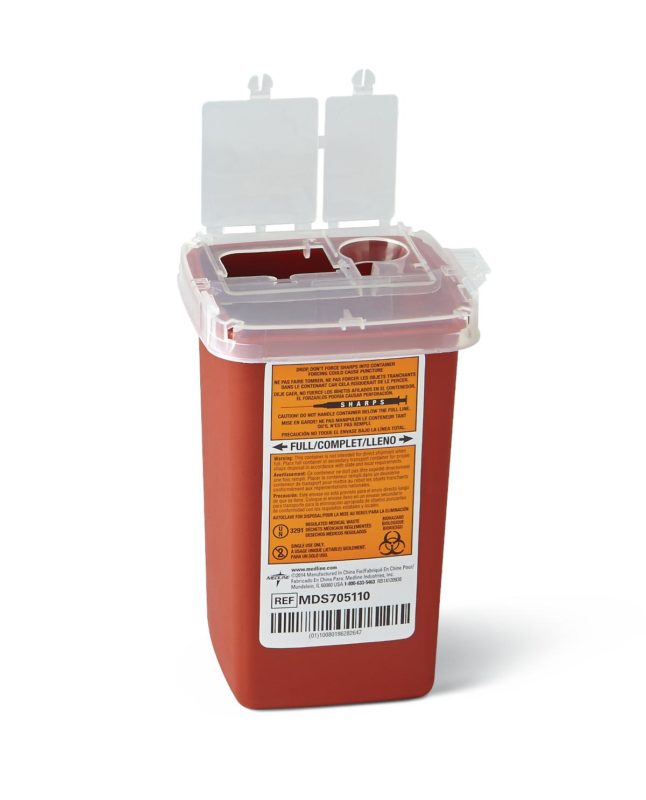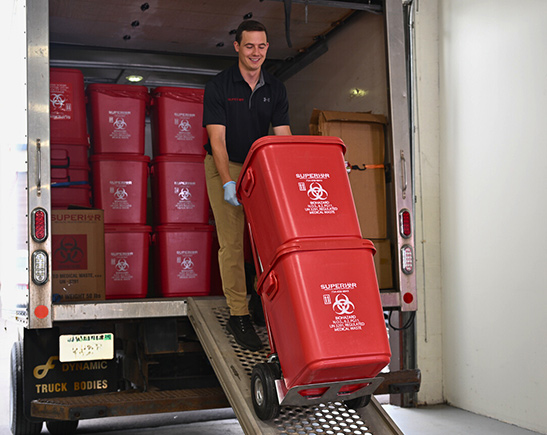Community Care: Seamless and Reliable Medical Waste Removal Near Me
Community Care: Seamless and Reliable Medical Waste Removal Near Me
Blog Article
Remain Ahead of Regulations: Specialist Suggestions on Medical Waste Disposal
In a globe where the healthcare industry is constantly advancing, it is important for medical facilities to remain ahead of laws when it pertains to the correct disposal of clinical waste. With stringent standards and constant regulatory changes, it can be challenging to browse the intricacies of this procedure. However, with expert guidance, facilities can ensure conformity and minimize risks connected with improper garbage disposal. From recognizing the different groups of clinical waste to implementing the best collection and segregation approaches, this discussion will supply important understandings and workable tips to aid centers remain ahead of regulations in the ever-changing landscape of clinical garbage disposal.
Comprehending Clinical Waste Categories
Understanding medical waste groups is necessary for correct disposal and administration in medical care facilities. Clinical waste refers to any type of waste created by health care tasks that might pose a risk to public wellness or the setting. It is critical to categorize clinical waste accurately to guarantee its risk-free handling, treatment, transport, and disposal.
There are numerous categories of medical waste that healthcare centers require to be acquainted with. The most typical categories include infectious waste, pathological waste, sharps waste, pharmaceutical waste, and chemical waste. Each category has certain guidelines and laws for its proper administration and disposal.
Pathological waste refers to human tissues, body organs, or body parts that require special handling and disposal. Pharmaceutical waste consists of expired, extra, or infected medications that require mindful handling and disposal.
Remaining Up-To-Date With Regulatory Adjustments
Remaining existing with governing modifications is important for healthcare centers to guarantee conformity and proper monitoring of medical garbage disposal. medical waste removal. With policies regularly advancing, it is essential for healthcare facilities to remain updated to stay clear of penalties, fines, and potential injury to the environment and public health and wellness
To remain in advance of governing changes, health care facilities need to develop a system for surveillance and monitoring updates. This can be done by signing up for governing newsletters, going to conferences and workshops, and proactively joining market organizations. Furthermore, centers ought to assign an employee or group responsible for remaining educated and disseminating information to appropriate stakeholders.
Normal interaction with governing agencies is also vital. Health care centers should develop partnerships with regional, state, and government firms to guarantee they recognize any modifications in policies that may affect their waste management methods. This can be done through routine conferences, engagement in public comment durations, and aggressive engagement with regulatory agencies.
In addition, healthcare facilities should think about partnering with waste management companies that concentrate on medical garbage disposal (medical waste disposal services with WasteX). These business are commonly well-versed in the current laws and can offer assistance and support to make certain compliance
Implementing Appropriate Collection and Segregation Techniques
To properly manage clinical garbage disposal, healthcare facilities must develop correct collection and partition techniques based on regulative standards. Executing these methods guarantees the secure handling and disposal of possibly harmful materials, safeguards the setting, and lessens the threat of injuries and infections to health care workers and the public.
Appropriate collection and partition techniques include the usage of assigned containers and labeling systems. Medical care centers must supply plainly labeled containers for different sorts of medical waste, such as sharps, infectious waste, pharmaceutical waste, and non-hazardous waste. These containers must be color-coded and clearly significant to avoid confusion and promote very easy recognition.
Furthermore, health care centers should train their staff on the appropriate treatments for collecting and setting apart medical waste. This consists of enlightening them on the various types of waste, the ideal containers to use, and the relevance of following regulations and standards. Routine training sessions and correspondence course need to be carried out to make certain that employee continue to be current on best practices.
Moreover, health care centers ought to establish a system for normal collection and disposal of clinical waste. This might involve partnering with accredited waste administration firms that specialize in clinical garbage disposal. These companies will certainly make sure that the gathered waste is carried and gotten rid of in conformity with regulatory needs.
Choosing the Right Disposal Techniques

Incineration is among one of the most typical and effective techniques for getting rid of particular kinds of medical waste, such as pathological waste and sharps. It medical waste disposal services with WasteX involves the controlled combustion of waste at high temperatures, reducing it to ash. Incineration can launch unsafe toxins into the air and add to air contamination.

Various other disposal techniques consist of chemical treatment, microwave therapy, and landfilling. Chemical treatment entails the use of chemicals to decontaminate and reduce the effects of the waste. Microwave therapy utilizes microwave power to heat and sanitize the waste. Landfilling involves hiding the waste in a marked garbage dump location (medical waste disposal services with WasteX). Nevertheless, landfilling should be the last hope because of the prospective threat of contamination to dirt and groundwater.
Making Certain Conformity Via Documentation and Training
After thoroughly thinking about the proper disposal techniques for medical waste, health care facilities have to ensure compliance with regulations and minimize ecological influence by applying effective documentation and training procedures. This action is crucial in keeping a sustainable and look at this site risk-free environment for both healthcare employees and the public.

Training is just as important in guaranteeing compliance with guidelines. Medical care workers who manage clinical waste needs to receive ideal training on waste segregation, managing, and disposal treatments. This training should cover topics such as the proper use individual safety tools, identification of different sorts of waste, and the right disposal approaches for each and every waste group. By offering thorough training, medical care centers can encourage their staff to make informed decisions and minimize the danger of inappropriate garbage disposal.
Verdict
Finally, remaining in advance of guidelines in medical waste disposal is essential for healthcare facilities. medical waste removal services. Comprehending the different categories of clinical find here waste, remaining updated with governing adjustments, carrying out proper collection and segregation methods, choosing the ideal disposal approaches, and making sure compliance through documentation and training are all important steps. By complying with these standards, healthcare companies can effectively get rid of and take care of of medical waste in a safe and liable way
From understanding the various categories of clinical waste to implementing the ideal collection and segregation approaches, this discussion will certainly offer beneficial understandings and actionable ideas to help facilities remain ahead of laws in the ever-changing landscape of medical waste disposal. - medical waste disposal services with WasteX
The most typical groups consist of transmittable waste, pathological waste, sharps waste, pharmaceutical waste, and chemical waste. Healthcare facilities ought to offer clearly identified containers for various kinds of clinical waste, such as sharps, infectious waste, pharmaceutical waste, and non-hazardous waste. Health care centers ought to establish a detailed system to tape and track all facets of clinical waste disposal, consisting of kinds of waste created, amounts, and disposal techniques utilized. Health care workers who deal with medical waste ought to receive appropriate training on waste segregation, handling, and disposal treatments.
Report this page